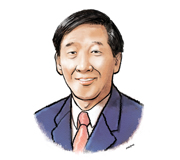War against rough drunks
Treatment should go together with punishment
“To go beyond is as wrong as to fall short.” ― Confucius (B.C. 551-B.C. 479)
Since it declared a war against violent drunkards a month ago, the Seoul Metropolitan Police Agency (SMPA) has arrested more than 100 violators. That is an impressive performance, even considering the Korean police’s reputation for short, campaign-driven operation. Nor should there be any opposition to their endeavors to keep public order and stabilize popular livelihoods. As the ancient Chinese sage discerned, however, some ill effects of the abrupt, overstretched social drive have begun to emerge.
“Alcohol-related violence is a crime in which ordinary people do harm to other ordinary poor people,” SMPA commissioner Kim Yong-pan said, explaining the background for his drive. “If the police capture 1,000 drunken villains in Seoul, we will be in a totally different world.” The remark befits a police head who won the “national productivity award” for a similar campaign when he headed North Chungcheong Province’s police agency, and even registered the word “jupok” (violent drunkards) as a trademark.
As this page pointed out earlier, however, the biggest problem is overzealous and indiscriminate crackdowns. Amid excessive competition among district police headquarters, some officers are carrying photos of habitual offenders to draw unfavorable testimonies from their neighbors. This sort of investigation by selecting targets and asking around their neighborhoods is going way too far.
No less serious is the lack of equity in dealing with suspects. While some cops were “trawling” the usual suspects most of whom are jobless, homeless or day laborers such as garbage collectors, others were setting free “high-class” violators, such as a director-general of the ruling Saenuri Party who fought with police officers.
More worrisome is the police seem to be forgetting most alcohol-related problems reflect social as well as individual ills that require not just punishment but treatment. It is especially regretful to hear the SMPA head say, “Arrest should go ahead of rehabilitation in handling jupok.”
Government statistics show 4.2-10.9 percent of adults are in a state of serious dependency on alcohol, and especially vulnerable to alcoholism are less-educated people and those who have family problems. These figures make one wonder whether harsh legal punishments alone will be able to cure these structural ailments. A more fundamental and comprehensive approach is needed to help these despondent people return to the embrace of society by providing them with shelter and opportunities for medical treatment.
Also problematic in this regard are the calls for giving additional penalties to offenses committed by drunks. It is at least as unreasonable as lessening punishment for reason of alcoholic influence. Drunken or not, violence should be treated as stipulated by law.
What best characterizes a mature, advanced society is whether and how much it cares for social underdogs. The government needs to try other measures first, like a temperance campaign and price and tax incentives, while controlling media advertisements and the drinking age.
Its teetotal policy should ultimately aim at saving individuals as well as containing damage to society. <The Korea Times>



